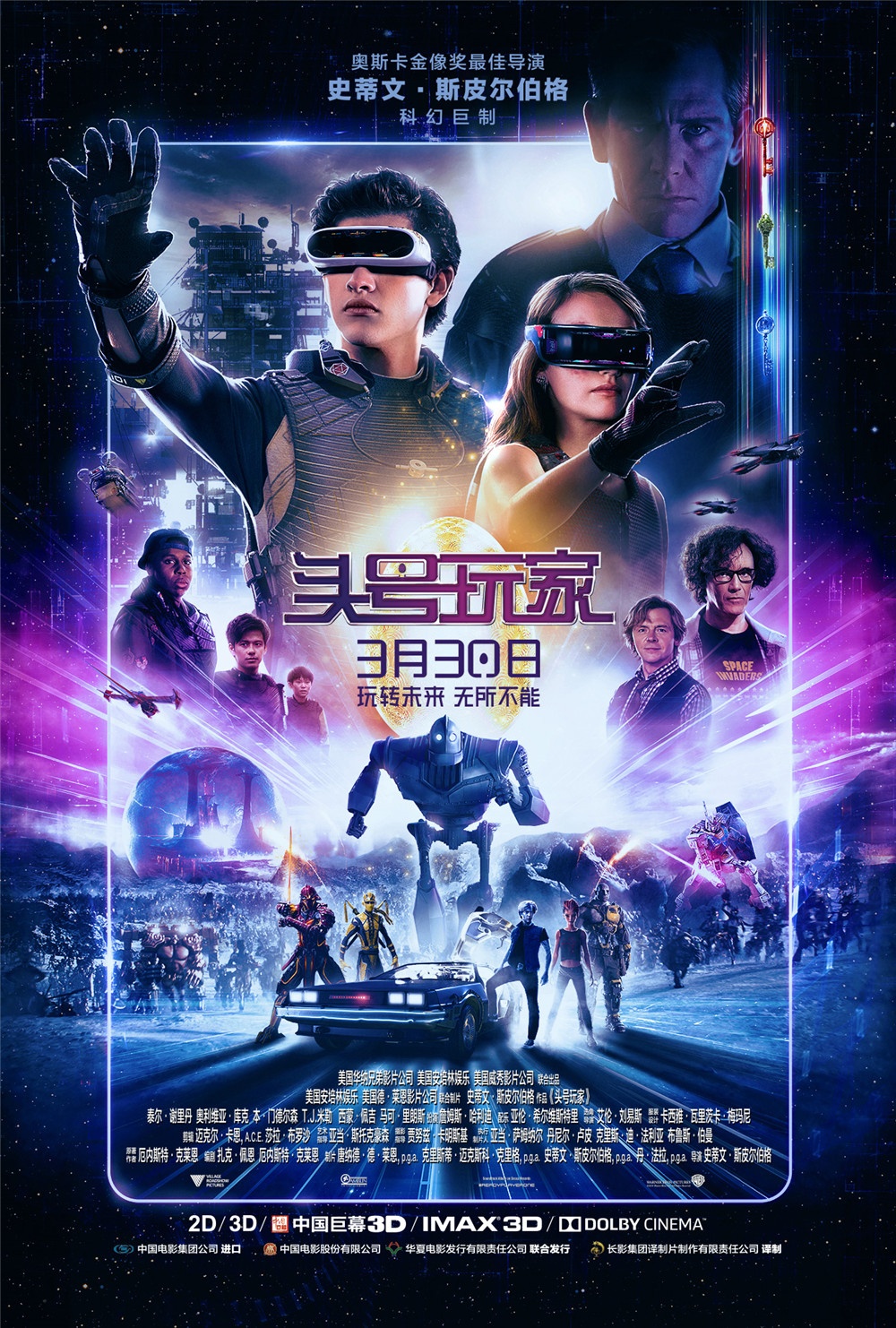
Ready Player One
Special feature of 1905 film network After four days of release, the box office was 450 million, and the Douban score soared to 9.1.
Completely fired!
This film is adapted from the novel of the same name by the otaku Ernst Klein, and there are hundreds of game movies.
I really can’t think of a more suitable candidate than Spielberg to turn such a book into a blockbuster.
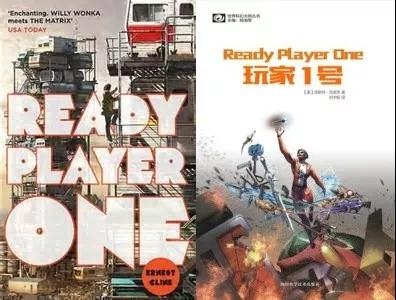
Cover of Ready Player One’s original novels in English and Chinese
Ready Player One is indeed a bestseller and has been translated into 20 languages. However, it caters to some people’s feelings, and at the same time, it is also considered by some readers as "otaku’s cool writing".
Among readers all over the world, some people dislike this book, and some people call it "Wikipedia about the 1980s" — — That is, those eggs are useless for narrative, and the only value is to let readers pat their thighs: ah, I know this!
At that time, Xiao Dianjun was made to want to throw a book by its narrative way of constantly throwing stalks.

The original author was called "the sexiest geek on the planet today" by USA-Today.
But when Spielberg first read this book, he was shocked by the author’s foresight for the future through these stalks. In order to make more people accept it, he injected what he was good at into this "history of popular culture in the 1980 s": longing for the future and trembling; Passion for creativity; There is even an inner observation of a lonely and talented boy.
When it was released in the past, the audience queuing to buy tickets filled several streets, and some people watched it several times.
They all want to immerse themselves in such a scene again:
In john williams’s soundtrack, pterosaurs flew across the sky, and giant Tyrannosaurus rex leisurely crossed the grassland. For the first time, people and ancient creatures hundreds of millions of years ago were separated by only one screen, and their hearts must be filled with awe.

After more than 20 years, we are lucky enough to look at a half-gorgeous and half-barren future through a screen, and we are as excited as those people in those years.
These dreamlike experiences are all attributed to Spielberg. A 72-year-old man, a big child.

As a famous director who has filmed the seventh sci-fi film, five of which have become classics in film history, Spielberg’s talent and imagination are well known. However, few people may notice that after close encounters of the third kind, he stopped writing his own plays, but explored and visualized the works of first-class best-selling novelists.
For example, Melissa Mathison, a female screenwriter, was hired for E.T. Alien, and the inspiration came from Kubrick, who wanted to adapt this short story herself.

Stills of E.T. Alien
Today, Xiao Dianjun wants to talk to you about two other classics — — Jurassic Park and, like Ready Player One, they are adapted from famous science fiction.
As one of the greatest directors of commercial films in Hollywood, Spielberg did this … …
Jurassic park
Come on, try Spielberg icing?
Jurassic Park is the first sci-fi film adapted by Spielberg, which comes from michael crichton’s novel of the same name.
It created a box office miracle.

After the film was released, it won 900 million dollars at the box office and became the highest-grossing film in history at that time. At that time, there was a crazy dinosaur craze, which inspired a lot of movies featuring dinosaurs and monsters, such as Godzilla in Japan.
A movie can sell well in a short time, perhaps just because of IP or dazzling special effects technology. But to become a classic, a solid script has become the top priority.
Michael crichton, the author of the original novel, is outstanding in his professional level. The man with a bright resume transferred from Harvard Literature Department to Anthropology Department, and also got a doctor of medicine from Harvard. It is precisely because of this hard-core knowledge of anthropology and medicine that his sci-fi thrillers are horrified … … Especially cultured.

Michael crichton, the author of the original novel
The most important genetic engineering technology in Jurassic Park was studied in 1970s. In 1984, scientists cloned gene fragments from the fur of spotted donkey 140 years ago, which proved that DNA can be replicated in inanimate biological tissues. Michael has been paying attention to this field. It took him seven years to publish Jurassic Park in 1990.
After the film was made, someone specially asked Paul Barrett, a dinosaur researcher at the British Museum of Natural History, if the film was all nonsense. The researcher replied: "Many scientific theories in the film are actually reasonable. Even the use of frogs makes sense, because they are quite commonly used laboratory animals in this field, and we know their gene sequences very well. Therefore, Jurassic Park was very avant-garde at that time. "
If such a novel is made into a movie, it must be changed greatly. Coincidentally, it met Spielberg — — Hollywood is the director who will sugar-coat all kinds of hard goods to satisfy the curiosity and security of most audiences.
What does Spielberg do?
His first step is to make the grandma selling tea eggs on the street understand the original professional and obscure words in the book.
For example, there is a classic "dinosaur DNA recovery animation" in the movie. What is said in the book is particularly complicated, but it is shown in a way similar to flash in the movie.

Animation explanation version of DNA restoration
Secondly, he will use the most advanced technology to revive the dinosaurs he was obsessed with since childhood, and then Amway will give them to audiences who have never been interested in them.
Spielberg once said in an interview: "When I was young, I even dreamed of dinosaurs. Therefore, when filming Jurassic Park, I thought more about my childhood memories and fantasies than the original novel. "
His favorite is Triceratops. When he saw Triceratops in a museum when he was a child, he sympathized with it. He once fantasized about what happened to it before it became extinct. So he deliberately set up a sick triceratops when he was filming.
He found the most advanced industrial light and magic studio at that time to build dinosaurs with computer special effects, and a small part of them spent huge sums of money to make models. Among them, the mechanical Tyrannosaurus Rex props weigh 12,000 pounds (about 5.4 tons), which can really crush people to pieces when started.
Designers also draw materials from various animals for the movement patterns of dinosaurs. For example, the brachiosaurus, the first appearance in Jurassic Park, is the first creature made entirely by computer special effects in the history of cinema. Its action of lifting its legs off the ground and roaring to the sky is taken from an elephant.
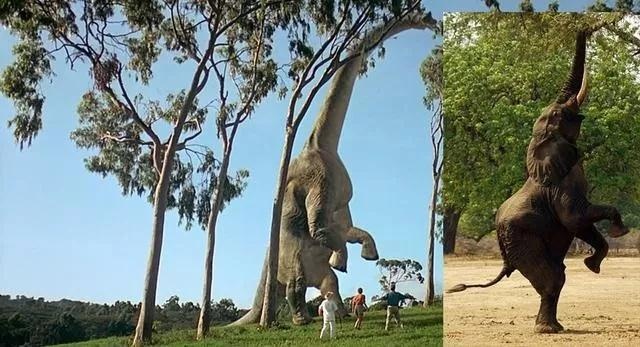
Brachiosaurus was taken from elephants.
The last layer of icing, which is also the thickest layer, is on the theme and narrative mode of the novel.
As many movie fans know, all the series of Jurassic Park add up, and only one tenth of the content of the novel is selected for adaptation.
In addition to too much professional knowledge, the original novel is also a dark, pessimistic and cruel world, full of all kinds of bloody and dark fragments as bad as Alien. In particular, the author’s attitude is calm and merciless. He thinks that there is no essential difference between natural creation of human beings and natural creation of dinosaurs. On the contrary, people make their own decisions to become creators, and the consequences they bring must be borne by themselves.
Just like the following fragment in the original work, if it is put on the big screen, it is estimated that many parents will stop their children from entering the cinema.
“Elena opened the door. The baby is lying in the cradle of wicker, wrapped in a light blanket, and only his little face is exposed. There are three dark black lizards squatting on the edge of the cradle, just like three grotesque statues. When they saw Elena, they looked up at her curiously, but they didn’t run away. In the light of the flashlight, Elena saw blood dripping from their mouths. A lizard barked softly, lowered its head, shook it quickly and tore a piece of meat from the baby’s face. Elena screamed and rushed forward, and the lizards flew into the darkness. However, as early as when she walked to the front of the cradle, she had already seen what the baby’s face looked like. She knew that the child must have died. "
Spielberg added a soft lens to the story. A lot of discussion in this part is omitted, and the main line of the film is taken as the story of the ultimate victory of the great escape of mankind, which promotes the brilliance of human nature. After letting the audience experience the thrill, they breathed a sigh of relief in happy ending.
In this way, the whole film is no longer sharp, but has played a psychological soothing role for the American audience at that time.
Minority report
Fans will be disappointed, but I am concerned about the future within reach.
If we say Jurassic Park, Spielberg is wrapping a dark kernel with syrup; Then, for Minority Report, what he did was to pick up a knife and carve the original mysterious shape into an angular shape.

After the release of Minority Report, its income was 350 million dollars, which was three times its cost. In the Hollywood Reporter’s best list of films starring Tom Cruise in 2016, the first place was Minority Report.
In fact, if Tom Cruise hadn’t recommended it, Spielberg probably wouldn’t have touched the novel at all. When he made this film, he once said: Philip Dick’s novels are not suitable for most movies, and I’m sure die-hard fans will be disappointed with the movies.
If michael crichton, the author of Jurassic Park, is an elite science fiction writer, then Philip Dick is a real diaosi geek. He dropped out of primary school, dropped out of secondary school, and was often in financial distress when he grew up. Writing science fiction became a pillar of his life. He started writing at the age of 27 and died at the age of 53. He published 44 novels and 121 short stories in his life.

Philip dick
His novels have a unique temperament and a surprisingly wide range of concerns. Unfortunately, when he was alive, most of his novels were published in some cheap science fiction magazines, and he was poor until he was old, even eating dog food for a time; After his death, he was gradually recognized and became the first science fiction writer recognized by the history of American literature. Blade runner, Total Memory, and the previous TV series Electronic Dream: Philip Dick’s World are all adapted from his novels.
Minority Report is one of his short stories, which is extremely short and the theme is very obscure. I guess Spielberg had a big head when he got it.
So, how to change it?
First, add a 50% murder case first!
Spielberg once said, "The success of this film depends on the characters 50% and the mysterious murders 50%."
There are only two murders in the novel Minority Report, but there are five murders in the film.
Although the protagonist in the novel is also a captain, he is an old man in his fifties who worries that his young subordinates will rob him of his seat every day. Tom Cruise, the captain of the film, is handsome and strong, with thick hair and bad habits such as taking drugs.
In order to enrich the plot, besides murder, Spielberg also added many action elements.
For example, fighting

Kidnap (a prophet)

The protagonist in the novel has only one core contradiction in the plot, that is, finding a way out, and has no previous history. However, in the movie, the director added a very deadly pre-historical trauma to the protagonist — — His five-year-old son was abducted by a swimming pool and has been missing ever since.
On the one hand, this design is to add key plots; On the other hand, it also aroused the audience’s sympathy for the protagonist who had been traumatized, and better integrated into this plot that was too cold.
Tom hanks looked at his son’s holographic projection.
Second, carefully build a future world
Philip Dick’s sci-fi novels are not only full of brains, but also famous for their imprecise techniques, which may be attributed to his extensive interests, but he has never systematically studied science and technology.
For example, some people laughed at him for still using the old TV set … …

Spielberg-style science fiction films, in addition to the complexity of the plot, must also have technology linked to the most cutting-edge technology at present. He is crazy about creating the "future", and he does not hesitate to make great efforts for it.
Starting with E.T. Alien, his way is not only to rely on imagination, but also to find experts to dig into details.
Three years after the film started shooting, he found 15 experts in different fields, including architects, novelists, computer engineers, biological scientists, MIT dean and so on, and brainstormed in a hotel for three days.
He wants these people to give him some advice on how to make a future world that is both convincing and different from ordinary science fiction movies. In three days, they actually worked out an 80-page plan, from architecture to technology.
Some inventions they came up with in 1999 have actually come true in today’s world.

Such as 3D screen, such as iris recognition authentication.
Spielberg described his imaginary future world like this: "The Internet is watching us, and the TV is watching us. We lost our privacy. An advertisement will suddenly appear in front of us and talk to us. "
Compared with the pessimism in Philip Dick’s novels, Spielberg is an optimist. He is always full of enthusiasm for new technologies that may come. When talking about this film, he once said: "I hope all the small technologies in the film will come true. We will have pollution-free transportation and newspapers that are automatically updated. "

Third, empathize with the audience, not scare them away.
The inspiration of Minority Report comes from Philip Dick’s own anxiety about the Cold War. In the struggle between the two great powers in the book, it is like a miracle that a little person wants to find a way out and survive. The whole novel is like a gloomy joke.
In the movie, the core of this story is replaced by the mainstream values of Hollywood, and it becomes a survival story that people should not lose hope under any circumstances and should fight against fate.

Some scary details in the novel have also been changed to more acceptable settings.
For example, in the novel, those prophets are actually mentally retarded and squeezed by the government without human rights. But in the movie, it was changed to a normal person, named after several crime novelists. Agatha, led by Agatha, guided Tom Cruise out of danger again and again with the image of "Goddess".

Changed mental retardation into a goddess
These changes have undoubtedly reduced the lingering pessimistic background and self-torture in Dick’s novels, and replaced them with Spielberg’s value that "human nature will always find a way out". If reading the original novel is like witnessing the fate of mankind being hung in the air, Spielberg will finally make everyone who watches it land on his feet and be satisfied.
Over the years, all the children who were shocked by such a big film have grown into middle-aged people, and it seems that Spielberg is the only one who hasn’t changed.
In last year’s documentary Spielberg, Xiao Li commented on Spielberg when he was young:

The child in the Arizona desert kept watching TV and movies, and one day slipped into the film company and found his destiny there. This is a touching Hollywood story in itself.
And Daniel Day Lewis said he was old:
We all have a shelf life, and it slipped away without our knowledge. But this may not be the case for Spielberg. He will love his job until he dies.
At least from Ready Player One’s point of view, they are all right.





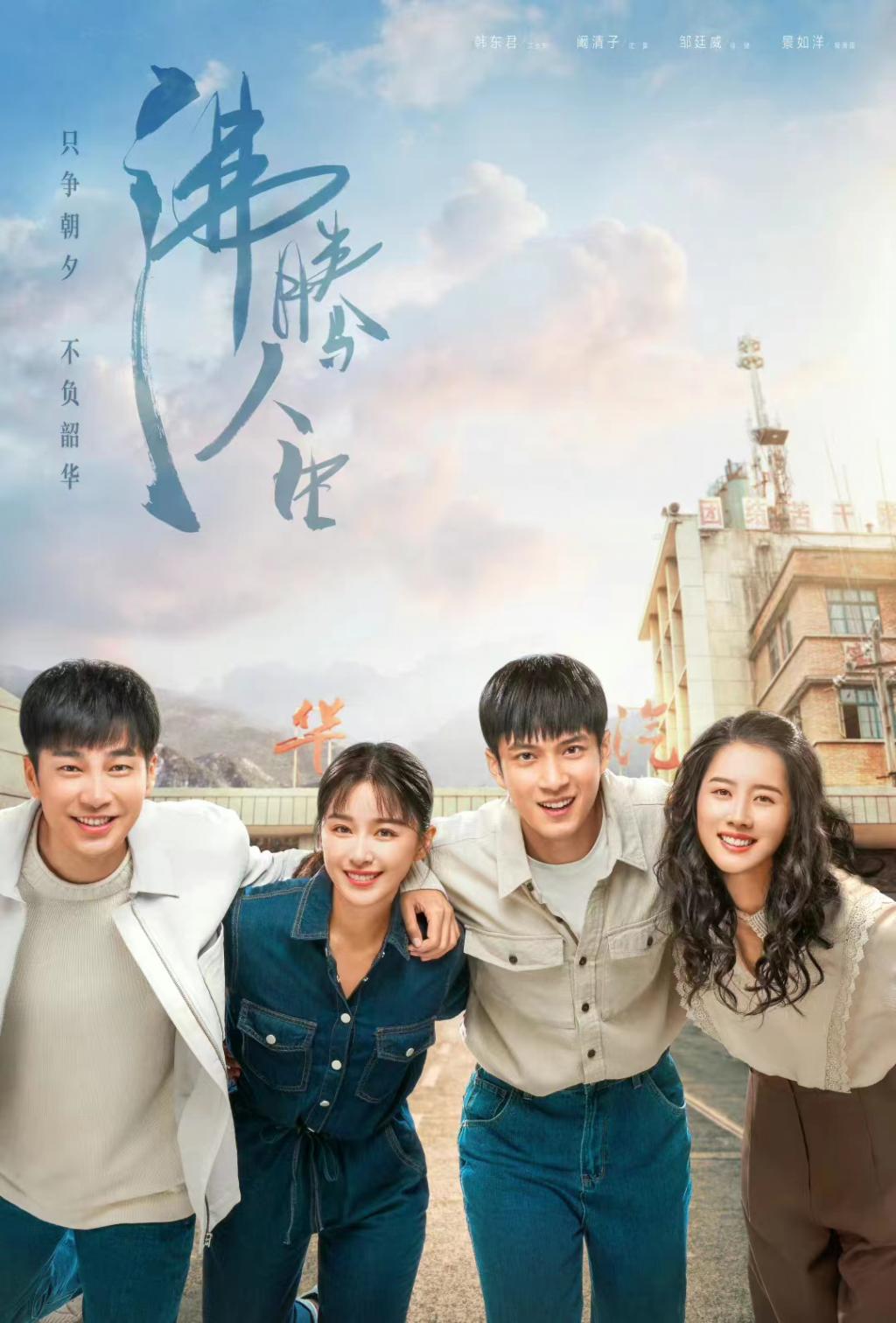
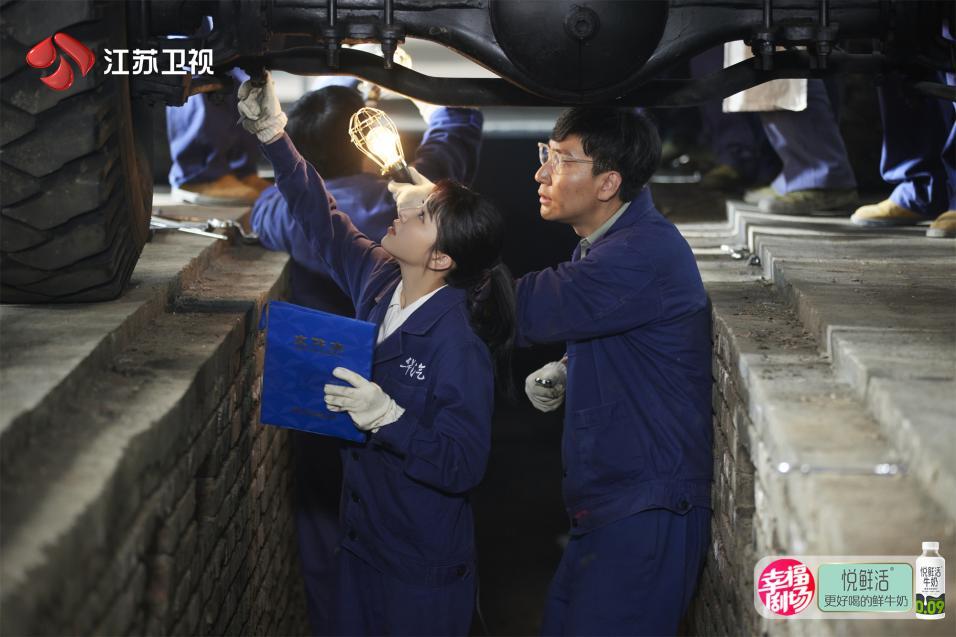
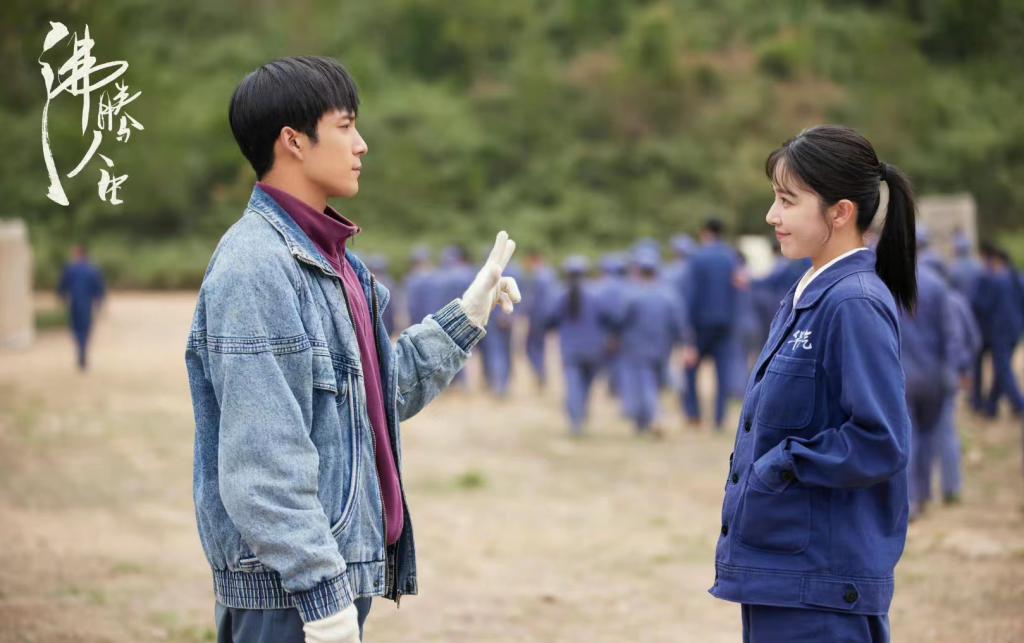
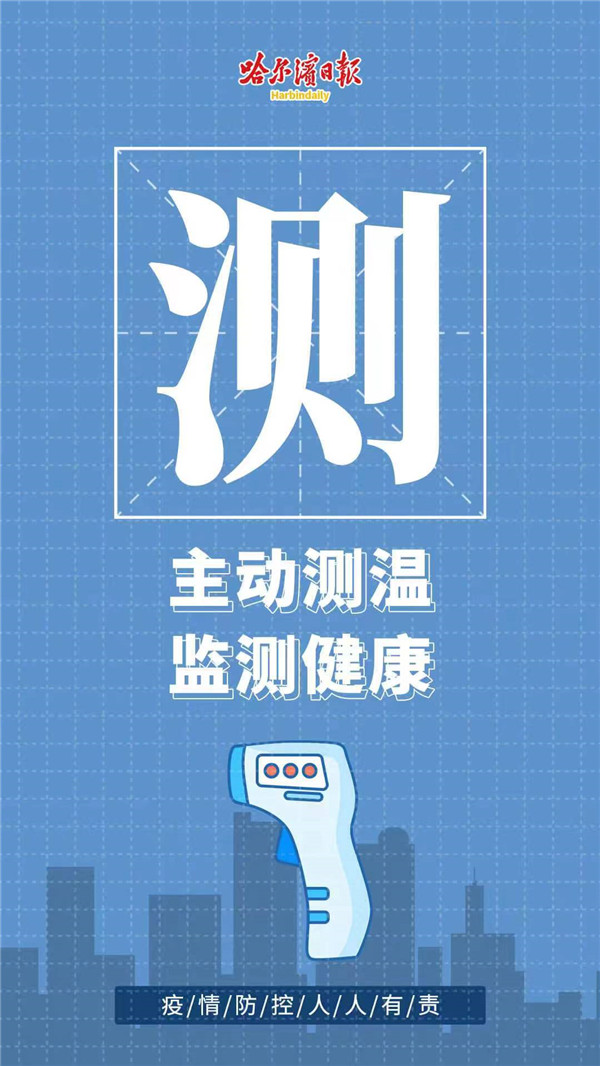
 、
、

































